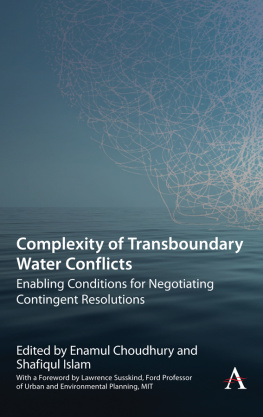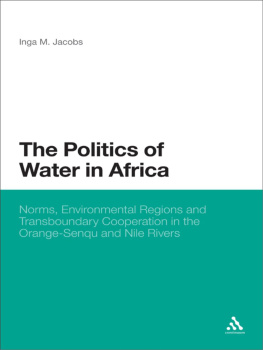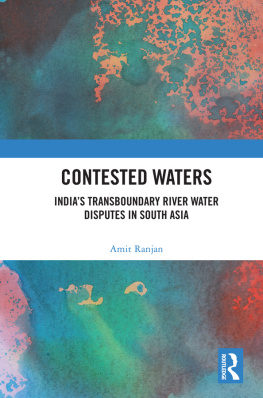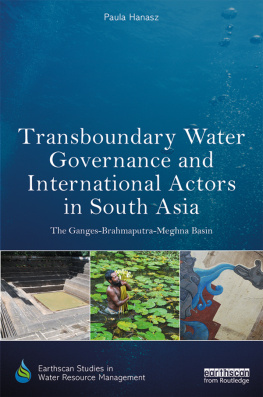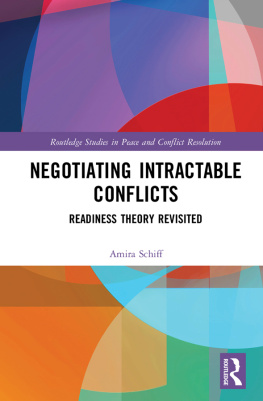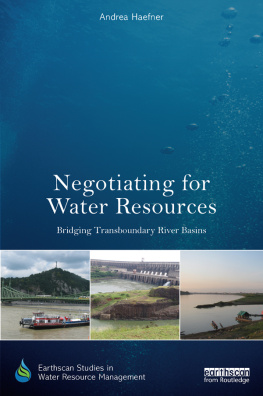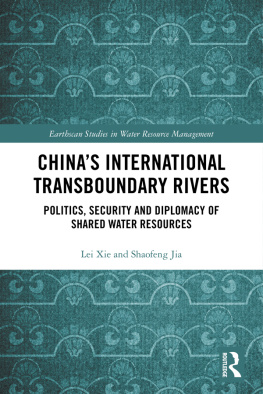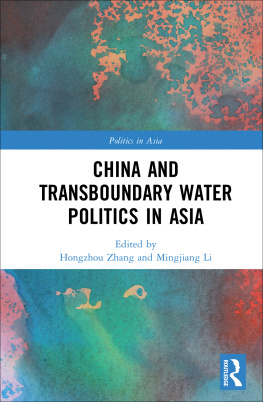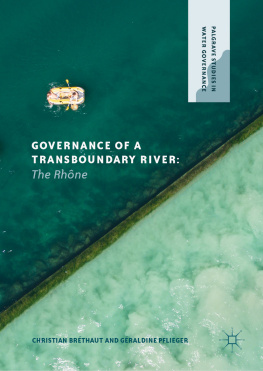Complexity of Transboundary Water Conflicts
Anthem Water Diplomacy Series
More effective resolution of our increasingly complex, boundary-crossing water problems demands integration of scientific knowledge of water in both natural and human systems along with the politics of real-world problem solving. Water professionals struggle to translate ideas that emerge from science and technology into the messy context of the real world. We need to find more effective ways to bridge the divide between theory and practice and resolving complex water management problems when natural, societal and political elements cross multiple sectors and interact in unpredictable ways. The Anthem Water Diplomacy Series is a step in that direction. Contributions in this series will diagnose water management problems, identify intervention points and possible policy changes, and propose sustainable solutions that are sensitive to diverse viewpoints as well as conflicting values, ambiguities and uncertainties.
Series Editor
Shafiqul IslamTufts University, USA
Editorial Board
Yaneer Bar-YamNew England Complex Systems Institute, USA
Qingyun DuanBeijing Normal University, China
Peter GleickPacific Institute, USA
Jerson KelmanFederal University of Rio de Janeiro, Brazil
Greg KochGlobal Water Stewardship, The Coca Cola Company, USA
Dennis LettenmaierUniversity of Washington, USA
Patricia MulroySouthern Nevada Water Authority, USA
Ainun NishatBRAC University, Bangladesh
Stuart OrrWWF International, Switzerland
Salman SalmanFellow, International Water Resources Association (IWRA), France
Poh-Ling TanGriffith Law School, Australia
Vaughan TurekianAmerican Association for the Advancement of Science, USA
Anthony TurtonUniversity of Free State, South Africa
Sergei VinogradovUniversity of Dundee, UK
Patricia WoutersUniversity of Dundee, UK
Complexity of Transboundary Water Conflicts
Enabling Conditions for Negotiating Contingent Resolutions
Edited by
Enamul Choudhury and Shafiqul Islam
Anthem Press
An imprint of Wimbledon Publishing Company
www.anthempress.com
This edition first published in UK and USA 2018
by ANTHEM PRESS
7576 Blackfriars Road, London SE1 8HA, UK
or PO Box 9779, London SW19 7ZG, UK
and
244 Madison Ave #116, New York, NY 10016, USA
2018 Enamul Choudhury and Shafiqul Islam editorial matter and selection;
individual chapters individual contributors
Cover Design: Amanda C. Repella
The moral right of the authors has been asserted.
All rights reserved. Without limiting the rights under copyright reserved above,
no part of this publication may be reproduced, stored or introduced into
a retrieval system, or transmitted, in any form or by any means
(electronic, mechanical, photocopying, recording or otherwise),
without the prior written permission of both the copyright
owner and the above publisher of this book.
British Library Cataloguing-in-Publication Data
A catalogue record for this book is available from the British Library.
ISBN-13: 978-1-78308-869-0 (Hbk)
ISBN-10: 1-78308-869-9 (Hbk)
This title is also available as an e-book.
CONTENTS
Lawrence Susskind
Enamul Choudhury and Shafiqul Islam
Shafiqul Islam and Enamul Choudhury |
Enamul Choudhury and Shafiqul Islam |
Enamul Choudhury and Shafiqul Islam |
Tahira Syed |
Nilanjan Ghosh and Jayanta Bandyopadhyay |
Ashok Swain |
Salman M. A. Salman |
Kevin Wheeler |
Bruno Verdini |
Mehdi Fasihi Harandi |
Naho Mirumachi |
Paula Hanasz |
Alexandra Campbell-Ferrari and Luke Wilson |
Shafiqul Islam and Enamul Choudhury
Enamul Choudhury and Shafiqul Islam bring an entirely new perspective to the study of transboundary water conflict. It is not possible, they argue, to identify the common causes of conflict between countries or parts of countries that must share water resources. Whatever commonalities appear to exist, and whatever general theories seem to hold, are likely to be swamped by the underlying dynamics in each situation. The key features of the underlying contextwhat they call enabling conditionsare crucial to understanding whats happening in each water conflict. Whatever cause-effect model or general explanation analysts think they have found, regardless of how many conflicts they study, complexity science suggests that every transboundary water conflict is, in fact, emergent. That is, it will continuously evolve as the unique underlying features in each case interact and fold back on each other in dynamic and unpredictable ways.
So whatever might have caused a disputecountries seeking to assert their sovereignty, rapid urbanization demanding a redistribution of potable water, construction of new energy infrastructure, changing environmental conditions affecting agricultural production and so onthe presenting features in each conflict and the opportunities to intervene will keep evolving. The ebb and flow of political, economic, ecological and other forces are almost impossible to forecast with confidence. Therefore, those who seek to intervene have no choice but to proceed on a contingent basis. That is, they must generate a wide range of scenarios describing what might happen as underlying conditions interact with proximate causes and effects in surprising ways, and they must be inventive with regard to the efforts they formulate to intervene in the hope of resolving a dispute, or moving it in a less contentious direction. There cannot possibly be a best method of resolving transboundary water disputes that is likely to work in all situations, or even promise to provide a good starting point. The stakeholders and decision makers in each situation have to share their concerns, collect information together, consult with scientists and engineers to formulate possible courses of action, perhaps undertake experiments and certainly arrange for close monitoring of changing conditions if they want to have any hope of achieving their interests. They will have to build institutional capacity sufficient to cope with a wide array of possibilities and patterns. There is no way of doing this that will work across all seven continents. There is probably not even a way of proceeding that will work repeatedly on the same continent. Underlying or enabling conditions are just too powerful to ignore. All we can say for sure is that they create a demand for adaptive intervention. The more experiences are shared around the world, however, the greater the chances the parties in each conflict will be able to think of something to try.
Islam and Choudhury have tapped a series of authors who have looked closely at the ways in which enabling conditions have shaped the emergence of transboundary water conflicts in the Danube basin, the Brahmaputra basin, the Ganges basin, along the Nile and the Colorado Rivers, in the Zayandehrud basin in Iran, the Uruguay River and in the Apalachicola-Chattahoochee-Flint River Basin in the Southeastern United States. Their case studies and reflections on the impact of enabling conditions in each instance lead not to a general model of how to manage transboundary water disputes, but rather to insights that can be used to inform conflict management efforts everywhere. The book is filled with ideas that ought to inform the personal theories of dispute-handling practice of water managers all over the world.

